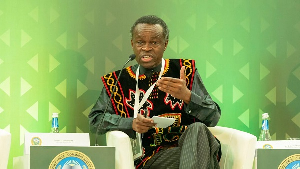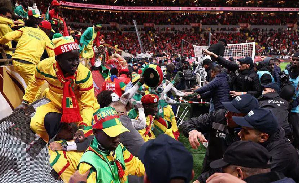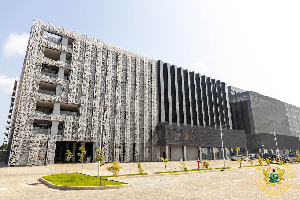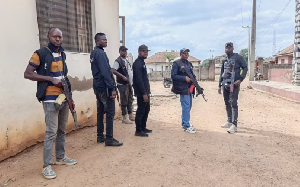How Ghana Descended to the Bottom of Global Education. Part I
By Dr. Samuel Adjei Sarfo
Attorney and Counselor at Law
The biggest ever global school rankings in the world has recently been published with Asian countries in the top five places, and African countries at the bottom. In this ranking, Ghana found itself at the very last of the pack. In reaction, many high government officials, including the Minister of Education, have raised several doubts about the integrity of this report, questioning its methodology and conclusion. But I was not in the least surprised that Ghana came last, specifically in science and mathematics education. My curiosity is how Ghana would have ranked if the research had focused on the liberal arts as well, namely history, law, linguistics and so on. Would the country have fared any better? I doubt it.
We should begin from the beginning and ask ourselves about the very policies and politics undergirding our educational system itself. And when we ask this question, we can take judicial notice of the fact that the general purpose of education is the modification of the individual’s character and his transposition into a good citizen invested with the skills and intellectual competence to solve societal problems. Then the follow-up question will be: How many of our educated elites are truly good citizens using the education they have acquired to solve any of our national problems? And if we realize that the answer borders on zilch, our next step is to go back to the first question and examine the very educational policy in the country to find out if its very aims and goals conform to our national policy standards: that of bringing about the citizens’ transformation for the purpose of investing in them the intellectual capacity to solve our national problems.
It is a fact that for a very long time, teachers, who hold the keys to our educational development, have been at the receiving end of the national economic collapse. Their salaries have been diminished on account of inflation, their allowances have been cut; and in some instances, their wages have gone unpaid for several months……….. And these issues facing the profession have resulted in discouraging many more qualified people from joining it. Thus the profession generally attracts personnel who don’t have any good alternatives for employment, or who merely use it as a stepping stone for better prospects. Ironically, even the teachers who escape the profession to join politics are prone to forget the plight faced by their colleagues, or to do anything about them. So the space of opportunities available for teachers for their advancement has shrunk over the years, until today, their chances for advancement remain virtually non-existent. Unsurprisingly, the profession has attracted some of the least capable and even morally irresponsible elements. But no teaching force composed of mediocrity or conceived in irresponsibility can modify the character of citizens, let alone endow them with the capacity and intellectual curiosity to solve our societal problems.
Couple the foregoing with the radical albeit negative educational reforms carried out in the early eighties, and one can acquire a sharper perspective into Ghana’s educational devolution from one of the best to the very worst. In the early eighties, the PNDC government under J.J. Rawlings, in responding to probable demands from the IMF, slashed the years spent in secondary school by more than half. Prior to Rawlings’ far reaching educational reforms, a student had to spend a total of seven years in high school, from form one to upper six, before proceeding to the University. And when this radical slash in duration was made, the transformation was quick and immediate. There were some students who initially thought that they had entered secondary school to do at least a five year program, only to wake up one morning to be told that they would qualify to graduate in the following year. Meanwhile, Rawlings and some of these politicians sent their children abroad to escape the educational turmoil they themselves had created in the country.
During Kufuor’s era, the three year high school was considered too short, and was therefore extended to four years, if only to bring it to par with the US and international standards. But one of the first actions of the present NDC government was to revert cynically to the three years of high school education. This back and forth within the educational structure had little philosophical or intelligent basis for it. Neither was it ever backed by any substantial and material infusion of resources into it. Indeed, any critical observer could interpret these goings on as sheer political gimmick, or even a virtual attempt to abandon any serious attitude toward qualitative education for which the country was well known. Now the cycle is complete since those half-baked products of a harangued system have found themselves into the classroom producing other half-baked scholars. Should it be any surprise then that today, the country has been put at the bottom of the global assessment of the quality of education?
And if we study how we came to this point, the matter should not be surprising to us at all because we are still continuing on the path of irreversible descent. After all, we have Samuel Okudzeto Ablakwa as our Minister responsible for Higher Education. This is an individual whose total experience in educational management measures up to the level of his stint as president of the National Union of Ghana Students. In Atta Mills’ time, he stated without compunction that within the first six months of its inception, the government had constructed over a hundred and twenty schools. He was also very active in promoting the huge payments to Woyome of thousands of dollars in judgment debt. When this whole issue of Ghana’s bottom position came up, he feigned ignorance of the methodology used and asked Ghanaians to wait with him for a proper studies of the report before concluding about our position. Meanwhile there is nothing that has not been explained in this report, and any curious individual with access to a computer can immediately access its methodology and conclusion and certify it as valid. So we have, as our education minister an individual dreaming up educational projects and concocting national debts and feigning ignorance of the methodology of a research that has put us at the bottom. And yet we are surprised that we are at the bottom?
Now any nation involved in any educational uplift will select the best of its citizens with the best of mind and interest to help manage the educational front, because everything else depends on it. And countries in Asia that scored high in educational achievements aptly reveal a trend that heavy investment in quality education is directly proportional to human quality, economic development, intellectual creativity and scientific innovation. In short, our whole national development hinges directly on how much seriousness we attach to our educational efforts. And when we do the proper balancing of the equities, we will be the first to acknowledge that our system of education has aptly descended to the bottom of the pack because of our extreme neglect, nonchalance and abuse.
But we can tickle ourselves by stating that not enough of African countries were sampled in the research. By this type of posture, we will merely be revealing our own inferiority complex and mediocrity. Are we advocating for a sample that encapsulates more of the worst so that we can be bumped up a little higher in the rankings? Is that how we can cover our shame? Such an attitude will not reveal any scientific or mathematical logic, and can only reveal further evidence that we deserve indeed to be at the bottom. This is because since time immemorial, Ghanaian educational administrators have touted this country’s system as one of the very best in the world. But this kind of assertion was never based in fact since on its face, Ghana’s educational infrastructure is one of the worst in the world. For example, the worst high school in Texas will be far better than any high school in Ghana, if only because such a building will be fully air-conditioned and have a fully equipped library, modern sporting facilities and a computer lab. And how do we propose that we can compete with the worst teaching-learning equipment and come out tops? And so where from this hullabaloo about being among the best in the world when we have not even invested in the basic wherewithal to compete with the best?
Dr. Samuel Adjei Sarfo is a practicing lawyer in Austin, Texas, USA. He writes the New Statesman weekly column “Thoughts of a Native Son”. You can email him at sarfoadjei@yahoo.com
Opinions of Saturday, 16 May 2015
Columnist: Sarfo, Samuel Adjei














